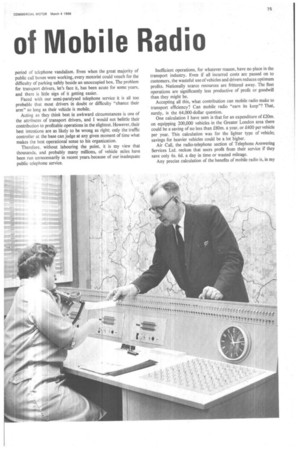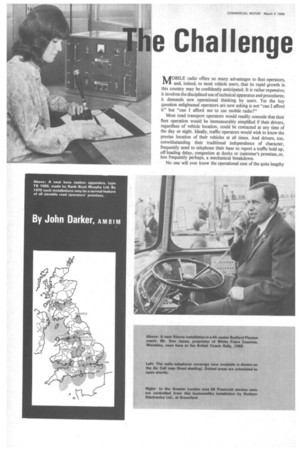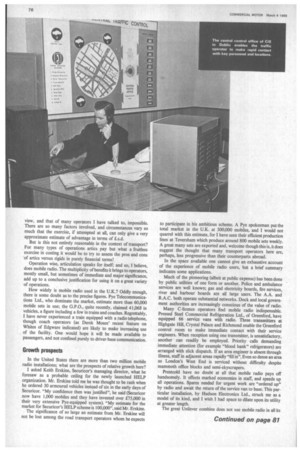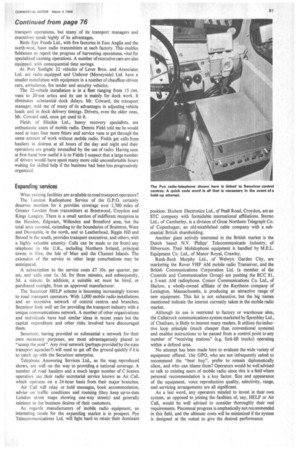of Mobile Radio
Page 77

Page 76

Page 78

Page 83

If you've noticed an error in this article please click here to report it so we can fix it.
MOBILE radio offers so many advantages to fleet operators; and, indeed, to most vehicle users, that its rapid growth in this country may be confidently anticipated. It is rather expensive; it involves the disciplined use of technical apparatus and procedures; it demands new operational thinking by users. Yet the key question enlightened operators are now asking is not "can I afford it" but "can I afford not to use mobile radio?"
Most road transport operators would readily concede that their fleet operation would be immeasurably simplified if their drivers, regardless of vehicle location, could be contacted at any time of the day or night. Ideally, traffic operators would wish to know the precise location of their vehicles at all times. And drivers, too, notwithstanding their traditional independence of character, frequently need to telephone their base to report a traffic hold up, off-loading delay, congestion at docks or customer's premises, or, less frequently perhaps, a mechanical breakdown.
No one will ever know the operational cost of the quite lengthy period of telephone vandalism. Even when the great majority of public call boxes were working, every motorist could vouch for the difficulty of parking safely beside an unoccupied box. The problem for transport drivers, let's face it, has been acute for some years, and there is little sign of it getting easier.
Faced with our semi-paralysed telephone service it is all too probable that most drivers in doubt or difficulty "chance their arm" so long as their vehicle is mobile.
Acting as they think best in awkward circumstances is one of the attributes of transport drivers, and I would not belittle their contribution to profitable operations in the slightest. However, their best intentions are as likely to be wrong as right; only the traffic controller at the base can judge at any given moment of time what makes the best operational sense to his organization.
Therefore, without labouring the point, it is my view that thousands, and probably many millions, of vehicle miles have been run unnecessarily in recent years. because of our inadequate public telephone service. Inefficient operations, for whatever reason, have no place in the transport industry. Even if all incurred costs are passed on to customers, the wasteful use of vehicles and drivers reduces optimum profits. Nationally scarce resources are frittered away. The fleet operations are significantly less productive of profit or goodwill than they might be.
Accepting all this, what contribution can mobile radio make to transport efficiency? Can mobile radio "earn its keep"? That, surely, is the 64,000-dollar question.
One calculation I have seen is that for an expenditure of £20m. on equipping 200,000 vehicles in the Greater London area there could be a saving of no less than £80m. a year. or £400 per vehicle per year. This calculation was for the lighter type of vehicle; savings for heavier vehicles could be a lot higher.
Air Call, the radio-telephone section of Telephone Answering Services Ltd. reckon that users profit from their service if they save only 6s. 6d. a day in time or wasted mileage.
Any precise calculation of the benefits of mobile radio is, in my view, and that of many operators I have talked to, impossible. There are so many factors involved, and circumstances vary so much that the exercise, if attempted at all, can only give a very approximate estimate of advantage in terms of £.s.d.
But is this not entirely reasonable in the context of transport? For many types of operations artics pay but what a fruitless exercise in costing it would be to try to assess the pros and cons -of attics versus rigids in purely financial terms!
Operation wise, articulation speaks for itself; and so, I believe, does mobile radio. The multiplicity of benefits it brings to operators, mostly small, but sometimes of immediate and major significance, add up to a conclusive justification for using it on a great variety of operations.
How widely is mobile radio used in the U.K.? Oddly enough, there is some doubt as to the precise figures. Pye Telecommunications Ltd., who dominate the market, estimate more than 60,000 mobile sets in use; the G.P.O., quite recently, claimed 41,068 in vehicles, a figure including a few in trains and coaches. Regrettably, I have never experienced a train equipped with a radio telephone, though coach operators (as Derek Moses' recent feature on Whites of Edgware indicated) are likely to make increasing use of the facility. One would hope it will be made available to passengers, and not confined purely to driver-base communication.
Growth prospects
In the United States there are more than two million mobile radio installations; what are the prospects of relative growth here?
I asked Keith Erskine, Securicor's managing director, what he foresaw as a probable ceiling for the newly launched HELP organization. Mr. Erskine told me he was thought to be rash when he ordered 30 armoured vehicles instead of six in the early days of Securicor. "My confidence then was justified", he said (Securicor now have 1,000 mobiles and they have invested over £75,000 in their very extensive Pye-equipped system). "My estimate for the market for Securicor's HELP scheme is 100,000", said Mr. Erskine.
The significance of so large an estimate from Mr. Erskine will not be lost among the road transport operators whom he expects to participate in his ambitious scheme. A Pye spokesman put the total market in the U.K. at 300,000 mobiles, and I would not quarrel with this estimate, for I have seen their efficient production lines at Teversham which produce around 800 mobile sets weekly. A great many sets are exported and, welcome though this is, it does suggest the thought that many transport operators here are, perhaps, less progressive than their counterparts abroad.
In the space available one cannot give an exhaustive account of the experience of mobile radio users, but a brief summary indicates some applications.
Much of the pioneering (albeit at public expense) has been done by public utilities of one form or another. Police and ambulance services are well known; gas and electricity boards, fire services, river and harbour boards are all large users. The A.A. and R.A.C. both operate substantial networks. Dock and local government authorities are increasingly conscious of the value of radio.
Many C-licence operators find mobile radio indispensable. Pressed Steel Commercial Refrigeration Ltd., of Greenford, have equipped 66 service vans with radio. Three transmitters at Highgate Hill, Crystal Palace and Richmond enable the Greenford control room to make immediate contact with their service engineers. When reception using one transmitter, is unsatisfactory, another can readily be employed. Priority calls demanding immediate attention (for example "blood bank" refrigerators) are arranged with slick dispatch. If an area engineer is absent through illness, staff in adjacent areas rapidly "fill in". Even so dense an area as London's West End is serviced without difficulty despite mammoth office blocks and semi-skyscrapers.
Prestcold have no doubt at all that mobile radio pays off handsomely. It effects marked economies in staff, and speeds up all operations. Spares needed for urgent work are "ordered up" by radio and await the return of the service van to base. This particular installation, by Hudson Electronics Ltd., struck me as a model of its kind, and I wish I had space to dilate upon its utility at greater length.
The great Unilever combine does not use mobile radio in all its transport operations, but many of its transport managers and executives speak highly of its advantages.
Birds Eye Foods Ltd., with five factories in East Anglia and the north-west, have radio transmitters at each factory. This enables fieldsmen to report the progress of harvesting operations, vital for specialized canning operations. A number of executive cars are also equipped. with consequential time savings.
At Port Sunlight 22 vehicles of Lever Bros. and Associates Ltd. are radio equipped and Unilever (Merseyside) Ltd. have a smaller installation with equipment in a number of chauffeur-driven cars, ambulance, fire tender and security vehicles.
The 22-vehicle installation is in a fleet ranging from 15 cwt. vans to 20-ton attics and its use is mainly for dock work. It eliminates substantial dock delays. Mr. Coward, the transport manager, told me of many of its advantages in adjusting vehicle loads arid in dock delivery timings. Drivers, even the older ones, Mr. Coward said, soon get used to it.
Fields of Hitchin Ltd., heavy recovery specialists, are enthusiastic users of mobile radio. Dennis Field told me he would
need at least four more fitters and service vans to get through the same amount of work without mobile radio. Fields get calls from hauliers in distress at all hours of the day and night and their operations are greatly intensified by the use of radio. Having seen at first-hand how useful it is to Fields I suspect that a large number of drivers would have spent many more cold uncomfortable hours waiting for skilled help if the business had been less progressively organized.
Expanding services
What existing facilities are available to road transport operators?
The London Radiophone Service of the G.P.O. certainly deserves mention for it provides coverage over 1,700 miles of Greater London from transmitters at Brentwood, Croydon and Kings Langley. There is a small section of indifferent reception in the Hendon, Edgware, Willesden and Brentford area, but the total area covered, extending to the boundaries of Braintree, Ware and Dunstable, in the north, and to Leatherhead, Biggin Hill and Strood in the south, provides transport executives, and others, with a highly valuable amenity. Calls can be made to (or from) any telephone in the U.K., including Northern Ireland, principal towns in Fire, the Isle of Man and the Channel Islands. The extension of the service to other large conurbations may be anticipated.
A subscription to the service costs E7 10s. per quarter, per set, and calls cost ls. 3d. for three minutes, and subsequently, 5d. a minute. In addition, a suitable set must be hired, or purchased outright, from an approved manufacturer.
The Securieor HELP scheme is becoming increasingly known to road transport operators. With 1,000 mobile radio installations and an extensive network of control centres and branches, Securieor look well set for providing the transport industry with a unique communications network. A number of other organizations and individuals have had similar ideas in recent years but the capital expenditure and other risks involved have discouraged them.
Securieor, having provided so substantial a network for their own necessary purposes, are most advantageously placed to "scoop the pool". Any rival network (perhaps provided by the state transport agencies?) will need to get off the ground quickly if it is to catch up with the Securicor enterprise.
Telephone Answering Services Ltd., as the map reproduced shows, are well on the way to providing a national coverage. A number of road hauliers and a much larger number of C-licence operators use their radio secretarial service known as Air Call, which operates on a 24-hour basis from their major branches.
Air Call will relay or hold messages, book accommodation, advise on traffic conditions and routeing (they keep up-to-date London street maps showing one-way streets) and generally minister to the business desires of their customers.
As regards manufacturers of mobile radio equipment, an interesting tussle for the expanding market is in prospect. Pye Telecommunications Ltd. will fight hard to retain their dominant
position. Hudson Electronics Ltd., of Peall Road, Croydon, are an STC company with formidable international affiliations. Storno Ltd., of Camberley, is a division of Great Northern Telegraph Co. of Copenhagen, an old-established cable company with a substantial British shareholding.
Another giant actively interested in the British market is the Dutch based N.V. Philips' Telecommunicatie Industry, of Hilversum. Their Mobilophone equipment is handled by M.E.L. Equipment Co. Ltd., of Manor Royal, Crawley.
Rank-Bush Murphy Ltd., of Welwyn Garden City, are marketing the Rover VHF AM mobile radio Transeiver, and the British Communications Corporation Ltd. (a member of the Controls and Communication Group) are pushing the BCC 81, a 5-watt AM radiophone. Cossor Communications Co. Ltd., of Harlow, a wholly-owned affiliate of the Raytheon company of Lexington, Massachusetts, is producing an attractive range of new equipment. This list is not exhaustive, but the big names mentioned indicate the interest currently taken in the mobile radio market.
Although its use is restricted to factory or warehouse sites, the Caliatruck communications system marketed by Spembley Ltd., of Chatham, is likely to interest many readers. It utilizes the inductive loop principle (much cheaper than conventional systems) and enables instructions to be passed from a control point to any number of "receiving stations" (e.g. fork-lift trucks) operating within a defined area.
No attempt has been made here to evaluate the wide variety of equipment offered. 1 he GPO, who are not infrequently asked to recommend the "best buy", prefer to remain diplomatically silent, and who can blame them? Operators would be well advised to talk to existing users of mobile radio since this is a field where personal recommendation is a key factor. Size and appearance of the equipment, voice reproduction quality, selectivity, range, and servicing arrangements are all significant.
As a last word, any operators minded to invest in their own system, as opposed to joining the facilities of, say, HELP or Air Call, would be well advised to consider thoroughly their real requirements. Piecemeal progress is emphatically not recommended in this field, and the ultimate costs will be minimized if the system is designed at the outset to give the desired performance.
























































































































































